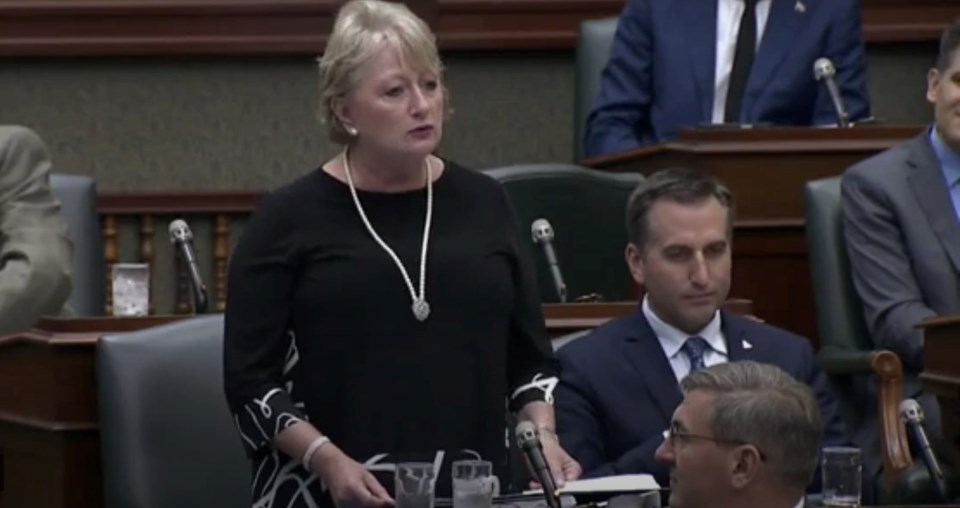Carbon tax discourse is heating up in Newmarket-Aurora with the federal government increase in the tax coming April 1.
Newmarket-Aurora MPP Dawn Gallagher Murphy has echoed calls from her Progressive Conservative government to halt the tax, which will see carbon pricing go from $65 per tonne to $80 April 1, a 23 per cent rise amounting to about three cents more per litre on gas.
The MPP has spoken out on the issue during question period in the provincial legislature 10 times since Feb. 4, asking different ministers about the increase.
“As I was knocking on doors in my great riding of Newmarket-Aurora, every single door, every person I spoke to, spoke to me about their concerns and their frustrations about the impact the federal carbon tax is having on their daily lives,” she said to the minister of energy March 19. “They want the federal government to address their concerns and make life more affordable."
But not every household in Newmarket-Aurora agrees with this perception of the federal carbon tax and Newmarket-area environmentalists say they support the policy.
Climate Action Newmarket-Aurora member Peggy Stevens said she is appalled seeing the recent push against the tax, which has been under fire from both provincial and federal Conservatives.
“Carbon pricing is not to blame for Canada’s affordability challenges,” she said, adding that the cost of climate change will be far greater. “It’s a really important policy.”
An Angus Reid Institute poll of Canadians found two-thirds believe the carbon tax is an added financial burden they can’t really afford, with 40 per cent saying it’s costing them “a lot,” while 26 per cent say it costs “a little.”
Half believe the government should focus on tackling the high cost of living over climate change, the poll said. However, 32 per cent think environmental policies should come first.
The federal carbon tax began in 2019, starting at $20 per tonne and has continually increased since. The federal government plans to increase it annually until 2030 by $15 per tonne, until it reaches a $170 per tonne cost. The current $65 per tonne cost amounts to about 14 cents per litre at gas pumps.
About 90 per cent of the tax is returned to Canadians via the Canada Carbon Rebate, delivered quarterly. The government said about eight of 10 households get more from this rebate than they spend in the carbon tax. In Ontario, the base amount for an individual for rebates is $560 per year, with additional amounts for children and living in rural areas.
“Apparently a lot of people didn’t know,” Stevens said. “I would say the criticism of the government for not getting the word out … (the rebate is) not nothing.”
However, the impact of the tax is increasing over time. A 2022 Parliamentary Budget Officer report estimates that although most households would still get more back from rebates than they lose on the taxes fuel costs, the economic impact of the tax could still leave most households worse off.
By 2030, the report estimates that the average Ontario household could be down $1,461 when the price of carbon reaches $170 per tonne. However, the tax would still be progressive, with the bottom 20 per cent of households in terms of income better off by $461 under the program, and the tax impacting those in lower income thresholds less.
Meanwhile, the Fraser Institute has estimated that the tax at its maximum will cause GDP to shrink by about 1.8 per cent and reduce real income in every province.
Gallagher Murphy has continued to criticize the impacts of the tax throughout several speeches in the legislature, and is critical of the federal government for not pausing the carbon tax increase.
“Families in my great riding of Newmarket-Aurora are concerned about the ever-rising costs of living. They are paying more for everything from their energy bills to grocery prices,” she said in the legislature. “The carbon tax is only making things worse.”
Although the tax is unpopular with many — 40 per cent want it banished — the number of people who support the increase on April 1 has grown by seven points since November, rising to 22 per cent from 15 per cent, the Angus Reid poll found.
However, 68 per cent of those polled don’t think the carbon tax helps reduce greenhouse gas emissions at all, while just 23 per cent think it’s effective.
But carbon pricing policies are making an impact toward addressing Canada’s emissions, according to some studies. The Canadian Climate Institute released a report this month that estimates industrial carbon pricing will be the biggest driver of reducing Canada’s greenhouse gas emissions, set to make up 23 to 39 per cent of Canada’s total emissions reductions.
“This analysis clearly demonstrates that climate policy is delivering results — with industrial carbon pricing leading the pack. Robust large emitter trading systems are fundamental to any credible climate policy package in Canada,” institute president Rick Smith said in a news release.
However, the report notes that though all carbon pricing plays a part in reducing emissions, industrial-based ones like Ontario’s emissions performance standard stand to be more than three times as effective in reducing emissions as consumer-based ones like the federal carbon tax one.
It estimates that industrial programs should reduce emissions by 53 to 90 megatonnes by 2030 across Canada, versus consumer carbon pricing reducing emissions by 19 to 22 megatonnes.
Ontario is keeping its industrial program in line with the federal minimum benchmarks, also increasing carbon pricing by $15 per tonne annually.
Stevens said there is a question of what policy could replace carbon pricing to address emissions.
“Despite the fact that just about everybody in the world believes climate change is real, and this is man-caused and it’s a crisis, they’ve got very, very reluctant leaders, and I think the reluctance is it’s easier to rile people up and say they’re being cheated,” she said, adding that “it’s easy to incite people.”



